Democratic Vanguardism
Democratic Vanguardism
Modernity, Intervention, and the Making of the Bush Doctrine
Michael Harland
LEXINGTON BOOKS
Lanham Boulder New York Toronto Plymouth, UK
Published by Lexington Books
A wholly owned subsidiary of Rowman & Littlefield
4501 Forbes Boulevard, Suite 200, Lanham, Maryland 20706
www.rowman.com
10 Thornbury Road, Plymouth PL6 7PP, United Kingdom
Copyright 2013 by Lexington Books
All rights reserved. No part of this book may be reproduced in any form or by any electronic or mechanical means, including information storage and retrieval systems, without written permission from the publisher, except by a reviewer who may quote passages in a review.
British Library Cataloguing in Publication Information Available
Library of Congress Cataloging-in-Publication Data
Harland, Michael.
Democratic vanguardism : modernity, intervention, and the making of the Bush Doctrine / Michael Harland.
pages cm
Includes bibliographical references and index.
ISBN 978-0-7391-7969-7 (cloth : alk. paper) -- ISBN 978-0-7391-7970-3 (electronic)
1. United States--Foreign relations--2001-2009. 2. Bush, George W. (George Walker), 1946---Political and social views. 3. Democracy. 4. Exceptionalism--United States. 5. September 11 Terrorist Attacks, 2001--Influence. I. Title.
E902.H358 2013
327.73009'05--dc23
2013030198
 TM The paper used in this publication meets the minimum requirements of American National Standard for Information Sciences Permanence of Paper for Printed Library Materials, ANSI/NISO Z39.48-1992.
TM The paper used in this publication meets the minimum requirements of American National Standard for Information Sciences Permanence of Paper for Printed Library Materials, ANSI/NISO Z39.48-1992.
Printed in the United States of America
For Francine
Acknowledgments
Over the four years I spent researching and writing this book, I have received valuable advice and support from a number of individuals and organizations. DemocraticVanguardism began life as a doctoral dissertation at the University of Canterbury in Christchurch, New Zealand. My thesis supervisors, Peter Field and Jeremy Moses, were exemplary mentors throughout the PhD process. As my senior supervisor, Peter provided a model of a consummate historianlively, probing, and passionate about the past. Jeremy, meanwhile, served as the co-supervisor for the thesis. His own research on the links between liberal international relations theory and armed intervention provided stimulus for this study. I am also grateful for the constructive suggestions I received from my doctoral examiners in Australia and the United Kingdom.
This book has benefitted from the friendship, critique, and scholarship of fellow graduates. Hannah Benbow read and commented on the early chapters of this work. Her eye for a mixed metaphor or wordy sentence helped eliminate the awkward turns of phrase that inevitably peppered rough drafts. James Illston, Tadashi Iwami, Christian Kundig, and Ben Nwosu likewise offered insightful feedback on chapter drafts at various stages. I have also benefitted from my conversations on all manner of topics from Nietzsche to nuclear proliferation with J. Jackson Ewing, Eliot Lynch, Colin Robinson, and Aiden Warren.
The research that underpins this book was funded by a Ryoichi Sasakawa Young Leaders Fellowship Fund scholarship from Massey University. This scholarship provided a stipend which allowed me to purchase books for research and attend conferences each year. My gratitude goes to Jackie Koenders, Naomi Collins, and the Sasakawa scholarship board for their generous support. The Department of History at the University of Canterbury offered a stimulating environment in which to study, and a number of opportunities to teach American history to intelligent and enthusiastic students. I would also like to thank Chris Dixon, Martin Crotty, and Geoff Ginn in the Department of History at the University of Queensland for hosting me as a postgraduate exchange fellow in August 2012.
The editorial and production staff at Lexington Books provided outstanding guidance on converting my dissertation into the present book. I particularly wish to thank Justin Race, Alissa Parra, and I. Lenore Lautigar for their management of the project and prompt responses to my queries. The blind-reviewer of the manuscript also provided a variety of useful suggestions that expedited its completion.
Portions of this study have previously been published as an article and two book reviews. Sections of chapters one, two, and the conclusion appear as the article Democratic Vanguardism: Francis Fukuyama and the Bush Doctrine in the 2012/2013 edition of ArenaJournal. I thank Allison Caddick and Paul James for permission to use this material. I also acknowledge the editors of the AustralianJournalofInternationalAffairs and the AustralasianJournalofAmericanStudies for allowing me to reproduce work that appeared in short book reviews.
The later chapters of this work were originally written during the Canterbury earthquakes that began on 4 September 2010. The second in this series of quakes, on 22 February 2011, killed 186 people and caused extensive damage to the city of Christchurch. In a natural disaster, it becomes clear that friends matter all the more. My thanks to Blair Bonnett, Scott Martin, Teri Anderson, and Frances Huisman for their camaraderie through some extraordinary times. My extended family consistently encouraged me throughout the writing of this book. But my wife, Francineto whom this book is dedicatedwas my strongest supporter of all.
Introduction
In a speech delivered on 1 June 2002 at West Point military academy in New York State, American President George W. Bush laid out his administrations vision for a free world. According to the President, the twentieth century ended with a single surviving model of human progress, based on non-negotiable demands of human dignity, the rule of law, limits on the power of the state, respect for women and private property and free speech and equal justice and religious tolerance. In the context of the war on terrorism launched after the terrorist attacks of September 11, 2001, realizing this goal would at times entail the use of armed force.
The Bush administrations subsequent National Security Strategy of the United States and a host of contemporary public addresses, together known as the Bush Doctrine, reiterated this ostensible connection between the fight against terrorism and the achievement of a wholly democratic globe. The Bush Doctrine consisted of four pillars. Firstly, the United States would work to consolidate its global pre-eminence and prevent the emergence of a hostile competitor. America had emerged victorious from the Cold War; upholding this hard-won hegemony was now a vital national interest. Secondly, the United States would adopt a policy of pre-emptive war against rogue states and their alleged terrorist allies. The events of September 11 demonstrated that America could not contain or accommodate its new enemies. In the future, the best defense would be a strong offense. Thirdly, the Bush administration held that, to protect its citizens, the United States would sometimes need to act unilaterally. Where international agreement could not be found, America would form coalitions of the willing to ensure the peace. Finally, the authors of the Bush Doctrine argued that democracy
promotion could serve as a weapon in the fight against terrorism. The authoritarian regimes of the Arab Middle East bred violent extremism. Reaching into those nations and actively converting them to representative government would make the United States more secure and promote international stability.
Next page
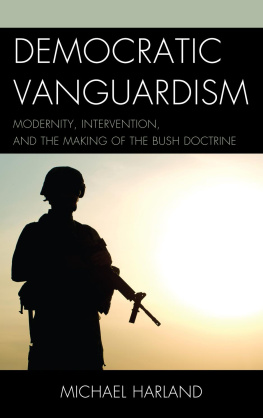

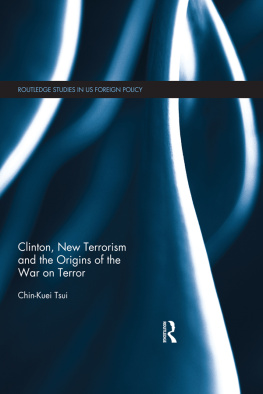
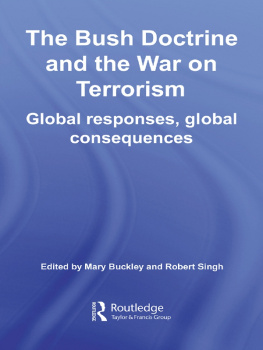
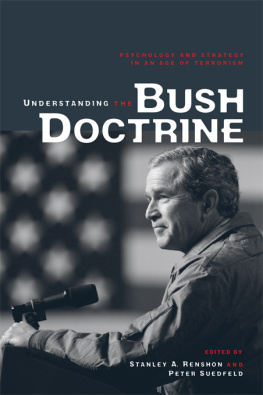
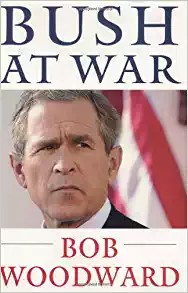
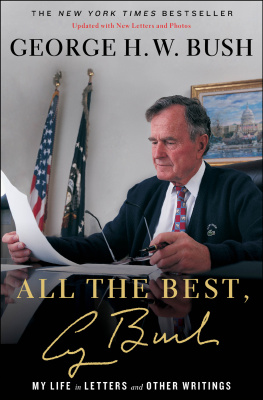
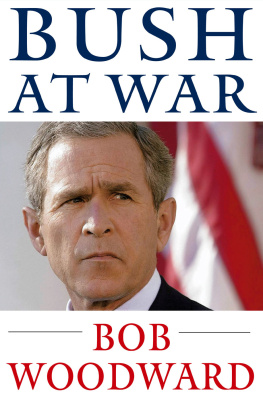
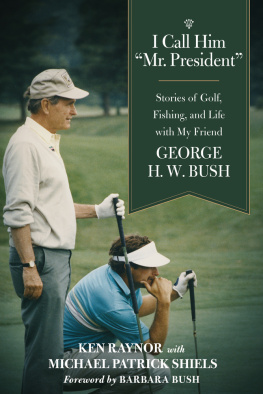
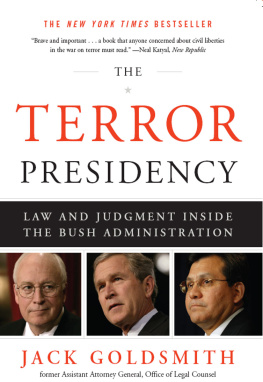
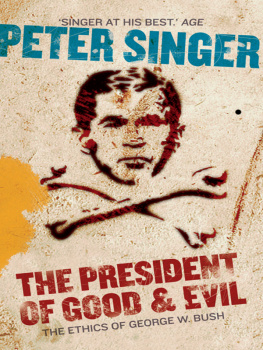
 TM The paper used in this publication meets the minimum requirements of American National Standard for Information Sciences Permanence of Paper for Printed Library Materials, ANSI/NISO Z39.48-1992.
TM The paper used in this publication meets the minimum requirements of American National Standard for Information Sciences Permanence of Paper for Printed Library Materials, ANSI/NISO Z39.48-1992.